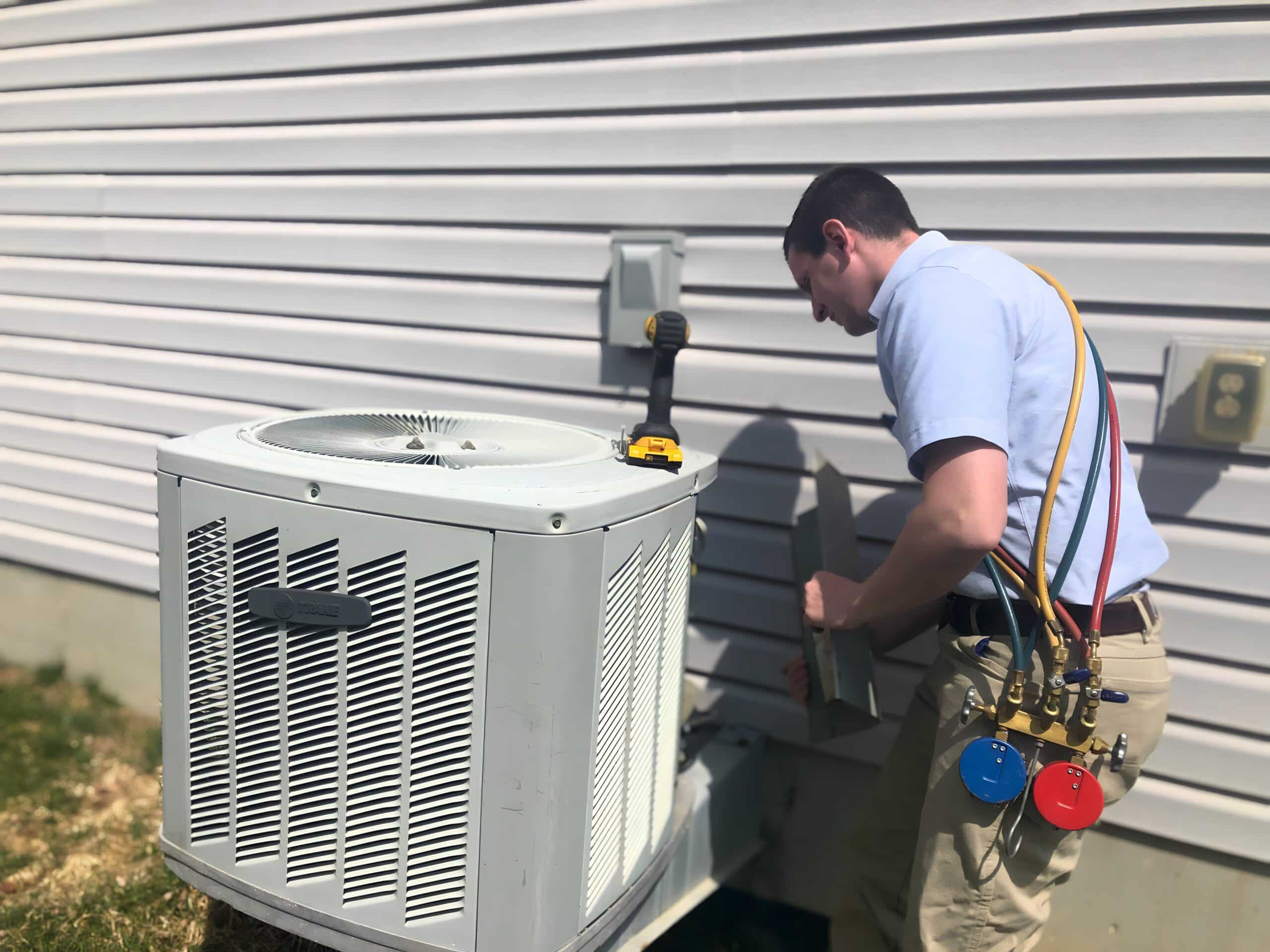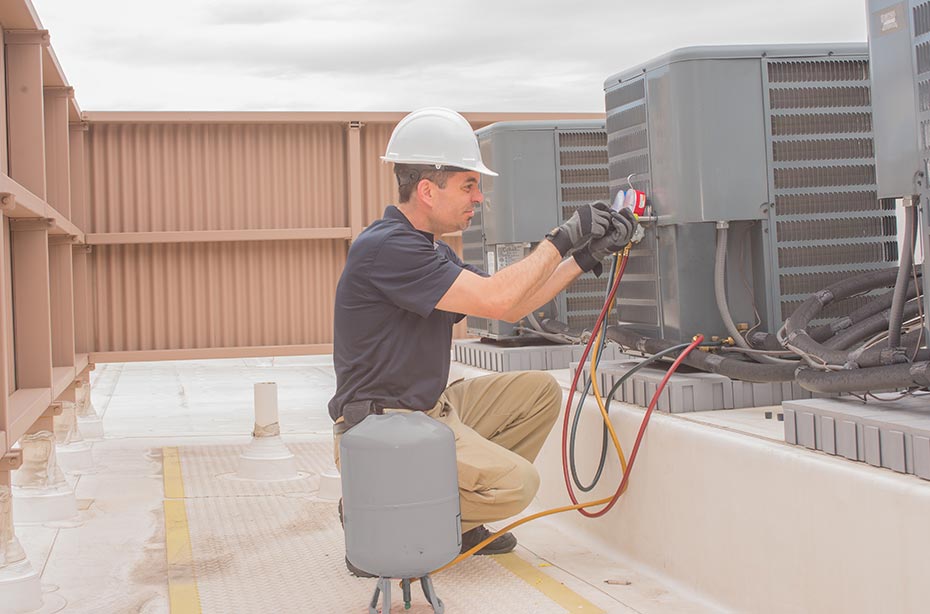Things to Know Before Your heat pump replacement ooltewah tn Starts
Things to Know Before Your heat pump replacement ooltewah tn Starts
Blog Article
Picking Between a Heatpump and Furnace: Secret Considerations for Your Heating And Cooling Needs
When reviewing home heating options for HVAC requires, the choice in between a warm pump and a furnace can be intricate. Each system provides unique benefits tailored to details environments and energy performance objectives. Comprehending these differences is essential for making an educated choice. Key variables such as installment expenses and ecological effect additionally make complex the option procedure. Which alternative truly lines up with one's convenience and sustainability preferences? The complying with sections will explore these factors to consider carefully.
Understanding Warm Pumps: Just How They Work and Their Benefits
While numerous house owners consider numerous home heating alternatives, recognizing exactly how warm pumps feature and their benefits can significantly influence their decision. Heatpump run by moving warmth instead of creating it. In the winter months, they remove warm from the outdoors air or ground and transfer it inside your home, while in the summer season, they reverse this procedure, cooling down the home by removing warmth outside. This double capability makes them flexible for year-round climate control.One of the primary benefits of heatpump is their power efficiency. They use considerably much less electricity compared to standard furnace, potentially causing reduced energy expenses (furnace replacement). Additionally, heatpump have a smaller carbon footprint, making them an eco-friendly choice. They likewise call for much less upkeep than standard systems, adding to long-lasting cost financial savings. Overall, recognizing the mechanics and benefits of heat pumps can aid homeowners make notified decisions regarding their heating and cooling down requirements
Exploring Heaters: Kinds, Procedure, and Advantages
Heating systems are available in different types, consisting of gas, electric, and oil versions, each with distinctive functional devices. Understanding these distinctions is vital, as they impact efficiency and home heating performance. In addition, heaters offer various advantages, such as constant warm output and reliability in cooler environments.
Kinds of Heating systems
Heater can vary significantly in layout and operation, with heaters being a prominent selection amongst property owners. There are several types of furnaces, each using various gas resources and innovations. Gas furnaces are common, leveraging gas to generate heat effectively. Electric furnaces, on the other hand, use electrical resistance to produce warmth, frequently favored for their simple installment. Oil furnaces, while much less common, work in areas with restricted gas gain access to (ductless mini splits). Additionally, condensing heaters make best use of power efficiency by recording and recycling exhaust gases. Each type runs via a system of warmth exchangers and ductwork to distribute cozy air throughout a home. Understanding the distinctions in between these furnace kinds is vital for educated HVAC decisions
Advantages of Heating systems
For homeowners looking for trusted heat throughout chilly months, the benefits of furnaces are considerable. Furnaces supply consistent home heating, making certain even temperature levels throughout the home. They are particularly efficient in extreme cool, frequently outshining heatpump in icy conditions. Different types, consisting of gas, electrical, and oil heaters, provide versatility to meet varied needs and preferences.Furnaces likewise often tend to have lower first installment costs compared to heatpump, making them a more available choice for numerous. Their durable design contributes to a much longer life-span, with several units lasting over 15 years with appropriate upkeep. Furthermore, contemporary heaters are usually furnished with sophisticated modern technology for boosted performance, which can bring about decreased energy expenses. On the whole, heaters continue to be a reliable selection for reliable home heating.

Power Effectiveness: Comparing Warm Pumps and Furnaces
When comparing energy performance between warmth pumps and heating systems, the Seasonal Power Performance Proportion (SEER) plays a vital role in identifying performance. Furthermore, a functional cost evaluation discloses the lasting monetary implications of each system. Recognizing these variables can guide homeowners in making educated choices about their home heating remedies.
Seasonal Power Performance Ratio
Power effectiveness plays a vital duty in the decision-making process in between warmth pumps and heaters, especially when taking into consideration the Seasonal Power Performance Proportion (SEER) This metric procedures the cooling performance of heatpump over a whole cooling season, supplying a standardized means to examine efficiency. Greater SEER ratings suggest better power effectiveness, equating to lower power consumption and minimized utility costs. In contrast, heating systems are generally assessed making use of the Annual Gas Application Performance (AFUE) rating, which shows heating effectiveness. When comparing these two systems, home owners should prioritize SEER ratings for warm pumps, as they directly influence general energy cost savings and environmental sustainability. A complete understanding of SEER can especially affect the long-lasting satisfaction and cost-effectiveness of the chosen heating and cooling option.
Functional Price Analysis
Understanding the operational prices associated with heatpump and heaters is crucial for house owners evaluating their options. Warm pumps generally provide greater energy effectiveness, converting electrical energy right into warmth with minimal waste. This results in lower monthly utility costs, particularly in modest environments. Conversely, conventional heaters, particularly gas versions, may have reduced ahead of time prices but can sustain greater operational expenditures in time due to sustain prices and performance ratings.Moreover, warm pumps can work as both home heating and cooling systems, possibly reducing the need for separate HVAC units. While initial investments for warmth pumps may be greater, their long-lasting cost savings in power effectiveness can make them a much more economical selection for several homes. Careful analysis of local energy rates is important to figure out the very best alternative.
Setup Costs: What to Anticipate for every Furnace
Installation prices for furnace can differ substantially between heatpump and furnaces, influencing homeowners' decisions. Heat pumps normally have greater in advance setup expenses, generally ranging from $3,500 to $8,000, depending on the unit size and complexity of setup. This includes the exterior device, interior handling system, and needed ductwork alterations. Conversely, heating systems often tend to have reduced first expenses, balancing between $2,500 and $6,000, which can be appealing for budget-conscious property owners. Setup visit our website expenses can increase if comprehensive ductwork is required.Moreover, the choice of gas type for heaters-- natural gas, propane, or electric-- can also affect installation prices. While heat pumps supply power effectiveness, their first financial investment may hinder some customers. Eventually, evaluating installation expenses together with long-term financial savings and performance will assist homeowners in making informed choices regarding their heater.
Climate Factors To Consider: Which System Carries Out Better in Your Area
Just how do environment conditions influence the effectiveness of heater? The performance of heatpump and furnaces can differ considerably depending upon the neighborhood climate. In moderate climates, warmth pumps stand out by successfully moving heat from the outside air, making them an energy-saving alternative. Their performance diminishes in extremely chilly temperatures, where they might have a hard time to draw out enough warmth. Conversely, heaters, especially gas models, provide constant and dependable warmth no matter of outside conditions, making them more effective in cooler regions.In locations that experience milder wintertimes, warm pumps can operate properly year-round, supplying both heating & cooling. In comparison, regions with harsh wintertimes commonly gain from the toughness of furnaces. Inevitably, understanding the regional environment is necessary when choosing between a warm pump and a heating system, as it directly influences their functional performance and overall efficiency.
Upkeep Needs: Long-Term Look After Warm Pumps vs. Furnaces
While both heat pumps and heaters need normal maintenance to guarantee peak performance, their specific requirements and care routines read what he said differ substantially. Heating systems normally require much less regular interest, with annual examinations being sufficient to examine for gas leaks, clean filters, and evaluate total performance. Their easier design usually permits uncomplicated repairs.In comparison, heatpump necessitate biannual maintenance due to their twin duty in cooling and heating. This consists of cleansing coils, inspecting cooling agent levels, and guaranteeing that both the indoor and outdoor devices operate at their finest. In addition, heat pump maintenance often entails more elaborate parts, making professional servicing essential.Neglecting upkeep can bring about reduced effectiveness and enhanced power expenses for both systems. Inevitably, homeowners should take into consideration these lasting care demands when selecting between a heatpump and a heating system, as proactive upkeep can extend the life expectancy and performance of either system significantly.
Environmental Impact: Selecting a Lasting Home Heating Option
The ecological influence of heater is a critical assessment for home owners looking for sustainable choices. Heatpump are typically extra energy-efficient than traditional heating systems, as they move heat as opposed to produce it, significantly lowering carbon discharges. By using renewable resource sources, such as geothermal or air-source warmth pumps, house owners can even more minimize their eco-friendly footprint.On the other hand, gas heating systems discharge greenhouse gases and contribute to Homepage air contamination, though they often provide higher warmth result. Improvements in technology have actually led to the growth of high-efficiency heating systems that minimize emissions.Ultimately, picking a home heating system entails weighing performance versus ecological effect. Property owners are urged to assess regional power resources and motivations for sustainable systems, making certain a choice that straightens with both personal convenience and environmental responsibility. The choice impacts not only immediate convenience yet likewise long-term sustainability and environmental health.
Regularly Asked Inquiries
The Length Of Time Do Warmth Pumps and Furnaces Usually Last?
The life-span of heatpump commonly ranges from 15 to twenty years, while heaters can last between 15 to three decades. Routine upkeep considerably affects their longevity and performance in providing home heating remedies.
Can I Make Use Of a Heatpump in Incredibly Cold Climates?
Warm pumps can operate in exceptionally cool climates, yet their effectiveness diminishes as temperature levels decline. In such problems, extra home heating sources might be required to maintain comfy indoor temperatures and guarantee peak performance.

What Is the Noise Degree of Warmth Pumps Versus Furnaces?
The noise degrees of heatpump and heaters vary substantially. Normally, heatpump run even more silently than conventional heaters, making them preferable for those conscious appear, while furnaces may produce louder operational sounds during heating cycles.
Are Heat Pumps Suitable for Both Home Heating and Cooling?
Warm pumps are undoubtedly ideal for both heating & cooling (heat pump service). They operate by transferring warmth, giving effective temperature level control year-round, making them a functional selection for house owners seeking an all-in-one heating and cooling service
What Size Heating Unit Do I Required for My Home?
Establishing the suitable size home heating system for a home requires evaluating elements such as square video, insulation top quality, regional climate, and the home's design. Consulting a specialist can guarantee an exact analysis and ideal convenience. Warmth pumps generally offer higher power efficiency, transforming electrical power right into warm with very little waste. In moderate climates, warmth pumps succeed by efficiently moving warm from the outdoors air, making them an energy-saving option. Conversely, heaters, particularly gas models, provide reliable and consistent warm regardless of outdoor conditions, making them preferable in colder regions.In areas that experience milder winters months, heat pumps can operate successfully year-round, giving both heating and air conditioning. Warm pumps are typically more energy-efficient than traditional heaters, as they transfer warm rather than create it, substantially minimizing carbon exhausts. By using renewable energy resources, such as geothermal or air-source heat pumps, house owners can further decrease their eco-friendly footprint.On the various other hand, all-natural gas heating systems discharge greenhouse gases and add to air contamination, though they usually offer greater warm outcome.
Report this page